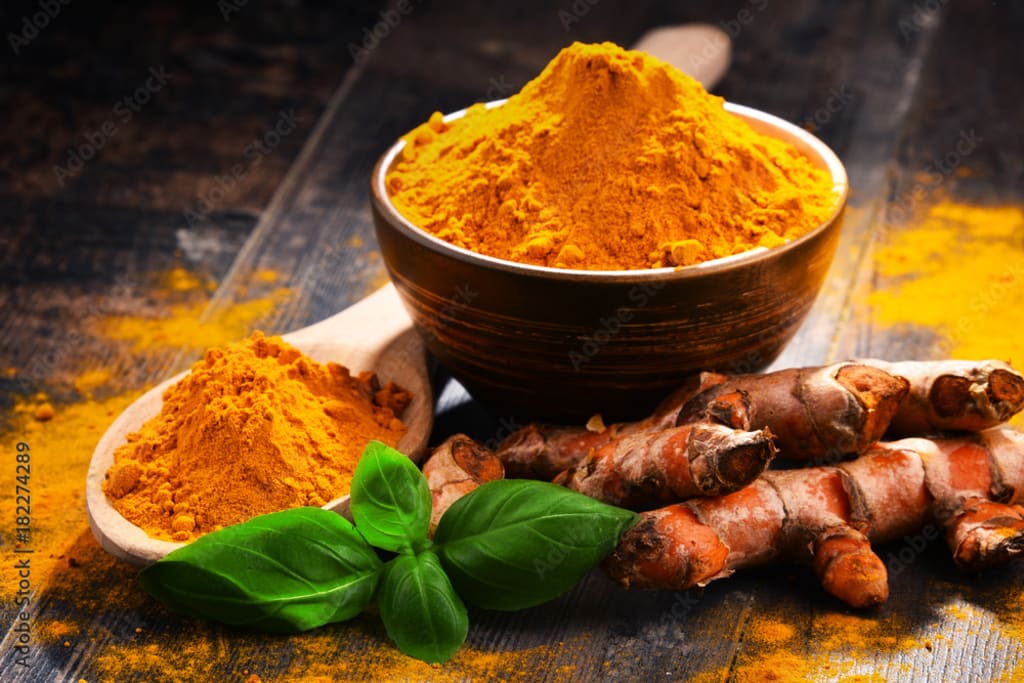50 benefits of turmeric
Here are 50 benefits of turmeric

Turmeric (Curcuma longa) is a flowering plant belonging to the ginger family, Zingiberaceae. It is native to the Indian subcontinent and Southeast Asia. The exact origin of turmeric is believed to be the region encompassing India and the neighboring countries of Bangladesh and Pakistan.
Historically, turmeric has been cultivated and used in these regions for thousands of years. It has played a significant role in traditional Indian medicine, Ayurveda, as well as in various cuisines and cultural practices. Turmeric has been a part of Indian culture for centuries and has been used in religious ceremonies, as a dye, and as a spice in cooking.
Over time, turmeric spread to other parts of the world through trade and exploration. It was introduced to the Middle East, Africa, and Europe by Arab traders around the 13th century. It later reached China and Japan, where it became an important ingredient in their cuisines and traditional medicines.
Today, turmeric is cultivated in many tropical regions worldwide, including India, Bangladesh, Pakistan, Sri Lanka, Myanmar, Thailand, Indonesia, and China. India remains the largest producer and consumer of turmeric globally. The root of the turmeric plant is harvested, dried, and ground to produce the vibrant yellow-orange spice commonly used in cooking and for its medicinal properties.
Turmeric powder, derived from the rhizome of the turmeric plant, is well-known for its culinary uses and vibrant yellow color. However, it also offers numerous potential health benefits due to its active compound called curcumin. Here are 50 potential benefits of turmeric powder:
1. Anti-inflammatory properties
2. Pain relief for arthritis and joint conditions
3. Potential cancer prevention
4. Improved digestion and reduced bloating
5. Enhanced liver function and detoxification
6. Protection against cardiovascular diseases
7. Lowered cholesterol levels
8. Blood sugar regulation for diabetes management
9. Support for weight management and metabolism
10. Boosted immune system function
11. Alleviation of chronic headaches
12. Anti-aging effects on the skin
13. Improved wound healing
14. Relief from menstrual pain and PMS symptoms
15. Potential treatment for inflammatory bowel disease (IBD)
16. Protection against neurodegenerative diseases like Alzheimer's and Parkinson's
17. Mood enhancement and reduction in depressive symptoms
18. Antiviral properties
19. Improved respiratory health and relief from asthma symptoms
20. Alleviation of allergy symptoms
21. Prevention of cataracts and eye-related diseases
22. Anti-bacterial properties
23. Accelerated recovery from sports injuries
24. Aid in the treatment of acne and other skin conditions
25. Protection against liver damage caused by toxins
26. Reduced risk of stroke
27. Relief from chronic pain conditions like fibromyalgia
28. Support for healthy cholesterol levels
29. Enhanced brain function and memory
30. Potential treatment for inflammatory skin conditions like psoriasis
31. Protection against DNA damage
32. Relief from gastrointestinal disorders like irritable bowel syndrome (IBS)
33. Improved dental health and prevention of gum disease
34. Anti-anxiety effects and stress reduction
35. Protection against the effects of radiation therapy
36. Potential treatment for inflammatory eye diseases like uveitis
37. Enhanced lung function and respiratory health
38. Aid in the treatment of liver disease
39. Support for healthy blood circulation
40. Reduction in the risk of certain types of cancer
41. Protection against kidney damage
42. Relief from chronic fatigue syndrome
43. Support for healthy bones and prevention of osteoporosis
44. Reduction in the severity of allergic reactions
45. Improved sleep quality
46. Prevention of gallstone formation
47. Support for healthy skin complexion and reduced acne scars
48. Aid in the management of metabolic syndrome
49. Protection against the harmful effects of heavy metal toxicity
50. Potential treatment for inflammatory skin conditions like eczema
Remember that turmeric has a vibrant yellow-orange color that can stain surfaces, clothing, and utensils, so handle it with care and be cautious while using it.
It's important to note that while turmeric has many potential health benefits, it's always a good idea to consult with a healthcare professional or a registered dietitian before making significant changes to your diet or incorporating new supplements. They can provide personalized advice based on your specific health needs and any potential interactions with medications you may be taking.
It's important to note that while turmeric powder shows promise in these areas, further scientific research is needed to fully understand and confirm its benefits. Additionally, turmeric should not be considered a replacement for professional medical advice, and individuals should consult their healthcare provider before using it for medicinal purposes.
About the Creator
Shamreena
Spread love and be loved by love💌.
Enjoyed the story? Support the Creator.
Subscribe for free to receive all their stories in your feed. You could also pledge your support or give them a one-off tip, letting them know you appreciate their work.






Comments
There are no comments for this story
Be the first to respond and start the conversation.